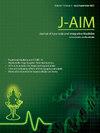瑜伽对压力管理的研究:2000年至2024年的文献计量趋势
IF 1.9
Q3 INTEGRATIVE & COMPLEMENTARY MEDICINE
引用次数: 0
摘要
瑜伽已经成为一种被广泛认可的管理压力的干预手段,人们对它在不同人群中的有效性越来越感兴趣。尽管研究不断扩大,但仍需要对文献中的趋势进行全面分析,以指导未来的研究和临床应用。目的分析瑜伽对压力管理研究的文献计量学趋势,了解该领域的出版模式、主要贡献者和发展方向。方法检索Scopus数据库2000 ~ 2024年有关瑜伽在压力管理中的应用的实验研究。我们对搜索标准进行了改进,纳入了与压力相关的瑜伽出版物,并且只关注用英语发表的文章。使用文献计量学工具进行定量数据分析,并使用VOSviewer创建可视化。结果对1025篇文献的分析显示,近24年,特别是近4年的文献发表量明显增加。《国际瑜伽疗法杂志》和《替代和补充医学杂志》是这一领域的主要期刊。美国和印度被确定为主要贡献者,其中Khalsa SBS和Nagendra HR是最多产的作者。随机对照试验、荟萃分析和系统评价成为主要的研究类型。这项全面的文献计量分析强调了瑜伽和压力管理研究的增长,强调了随机对照试验和循证实践。未来的研究应该探索瑜伽对不同年龄、职业和文化人群的影响,以阐明其普遍适用性,推进研究和临床应用。本文章由计算机程序翻译,如有差异,请以英文原文为准。
Research on Yoga for stress management: Bibliometric trends from 2000 to 2024
Background
Yoga has emerged as a widely recognized intervention for managing stress, with growing interest in its effectiveness across various populations. Despite expanding research, there remains a need for comprehensive analysis of trends within the literature to guide future studies and clinical applications.
Objective
This study aimed to analyze bibliometric trends in research on yoga for stress management, providing insights into publication patterns, key contributors, and evolving research directions in this field.
Methods
The experimental studies related application of yoga for stress management were searched from 2000 to 2024 on Scopus database. The search criteria were refined to include publications on yoga related to stress, with a focus exclusively on articles published in English. Quantitative data analysis was conducted using bibliometric tools, with visualizations created using VOSviewer.
Results
The analysis of 1025 articles revealed a significant increase in publications over 24 years, especially in the past four years. The International Journal of Yoga Therapy and the Journal of Alternative and Complementary Medicine were leading journals in this field. The United States and India were identified as primary contributors, with Khalsa SBS and Nagendra HR being the most prolific authors. Randomized controlled trials, meta-analyses, and systematic reviews emerged as predominant study types.
Conclusion
This comprehensive bibliometric analysis highlights the growth of yoga and stress management research, emphasizing randomized controlled trials and evidence-based practices. Future studies should explore yoga’s impact on diverse populations by age, occupation, and culture to clarify its universal applicability, advancing research and clinical applications.
求助全文
通过发布文献求助,成功后即可免费获取论文全文。
去求助
来源期刊

Journal of Ayurveda and Integrative Medicine
INTEGRATIVE & COMPLEMENTARY MEDICINE-
CiteScore
4.70
自引率
12.50%
发文量
136
审稿时长
30 weeks
 求助内容:
求助内容: 应助结果提醒方式:
应助结果提醒方式:


